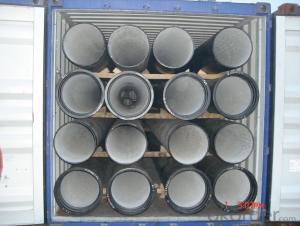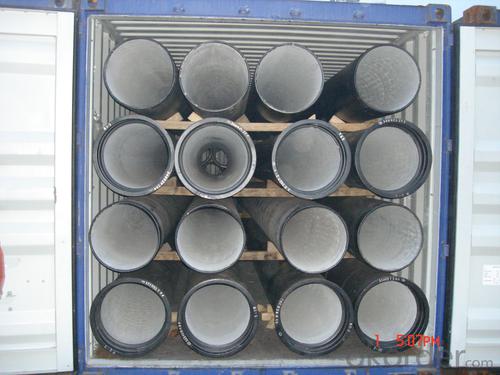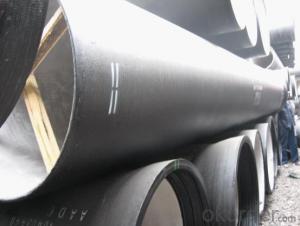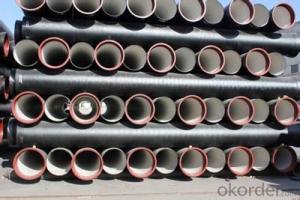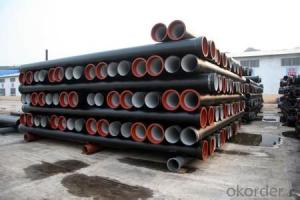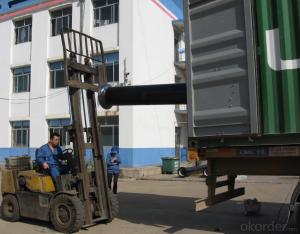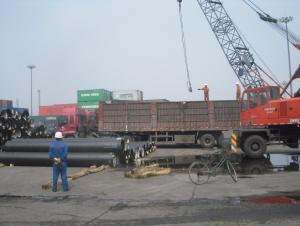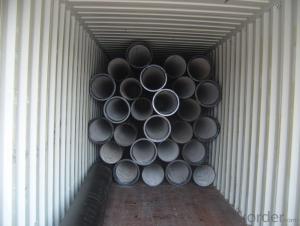DUCTILE IRON PIPES K8 DN300
- Loading Port:
- China Main Port
- Payment Terms:
- TT OR LC
- Min Order Qty:
- -
- Supply Capability:
- -
OKorder Service Pledge
OKorder Financial Service
You Might Also Like
Ductile Iron Cast Pipe is without any defects compare with tradition casting tech, which has many advantages particularly as follow:
(1) High density. In the "vertical upward casting" process, the melt iron of centre liquid column in center crystallizer is continuously feeding for volume shrinkage caused by condensation tube at outer circumference , which lead to be free of shrinkage porosity.
(2) High purity. When melt iron pouring, the mixed impurities such as gas, dross, sand grain which are lighter than melt iron could be eliminated at furnace mouth, its impossible to enter into the crystallizer through the channel, so the melt iron into the crystallizer is very pure.
(3) Strength with toughness. The cooling speed provided by continuous crystallizer is 30 times than sand casting and 5 times than centrifugal casting, and doesn't produce white iron, the eutectic cell volume of continuous cast iron is one eighth to one tenth compare with traditional cast iron. The density of graphite nodule in ductile iron can reach 300-700 pcs/mm2. Therefore, all reason above improve the strength and toughness of continuous cast iron.
(4) Free machining. The high speed cooling make the hardening phase (such as boride, steadite) not appear like reticular, massive or thick, but diffuse like fish bone and pane in shape, moreover, there are tiny graphite flakes inlaid hardening phase. It's free machining in BrinellHardness the range of 250-300HB. However, the Brinell Hardness of 250 is top limit to common metal materials.
(5) Uniform composition of tube wall. The convection mixing of liquid column caused by marching type drawing in crystallizer make the composition of tube wall well-distributed, and concentration gradient very little.
(6) High productivity. To the wall thickness of tube under 10mm, the speed of continuous casting is 1 meter/min, to the wall thickness of tube under 20mm, the speed of continuous casting is 0.5 meter/min, which is high efficiency that centrifugal or other casting tech couldn't reach.
- Q: Are ductile iron pipes suitable for mining applications?
- Yes, ductile iron pipes are suitable for mining applications. Ductile iron is a type of cast iron that has been treated to enhance its strength, durability, and ductility. These pipes are known for their high tensile strength and resistance to corrosion, making them ideal for underground mining operations where they may be exposed to harsh conditions. One of the key advantages of ductile iron pipes in mining applications is their ability to withstand high pressure and heavy loads. They have excellent structural integrity and can resist both internal and external forces, ensuring reliable performance in demanding mining environments. Additionally, ductile iron pipes have a long service life and require minimal maintenance. They are highly resistant to abrasion, which is crucial in mining operations where abrasive materials like rocks, minerals, and ores are present. The smooth inner surface of these pipes also minimizes friction, allowing for efficient transportation of mining materials. Moreover, ductile iron pipes are cost-effective compared to alternative materials like steel or concrete. They have a lower upfront cost and require less frequent replacements, resulting in reduced long-term expenses for mining companies. In conclusion, ductile iron pipes are well-suited for mining applications due to their strength, durability, resistance to corrosion and abrasion, long service life, and cost-effectiveness. These pipes provide reliable and efficient transportation of mining materials, contributing to the overall efficiency and productivity of mining operations.
- Q: Maximum pipe diameter of ductile iron pipe
- The maximum diameter of ball milling cast iron pipe can be DN3000.. For long pressure pipeline, the performance of ball milling cast iron pipe is better than that of PCCP tube, and the performance is reliable, safe and stable!
- Q: How do ductile iron pipes handle thermal expansion and contraction?
- Ductile iron pipes are specifically designed to handle thermal expansion and contraction effectively. Due to their unique composition and structure, which includes graphite nodules in the iron matrix, these pipes have the ability to accommodate temperature variations without significant damage or distortion. The graphite nodules act as flexible joints, allowing the pipe to expand and contract without cracking or breaking. This characteristic makes ductile iron pipes highly resistant to the stresses caused by thermal fluctuations, ensuring their long-term durability in various temperature environments.
- Q: Does the cast iron pipe need separate corrosion protection?
- The pipe has been antirust in the production process and can be used directly
- Q: What is the use of ductile iron?
- Ductile iron is used as a conduit at the beginning. Iron pipes and fittings are mostly produced by major industrial countries. Their manufacture, design and use are in line with national standards and international standards and procedures (I502531). As far as water and other liquids are concerned, it has long been proved that ductile iron pipes are superior to gray iron pipes. The main reason for this change is the combination of strength and toughness of Ferritic Ductile Iron, which makes the pipes made of this material subject to high operating pressures and can be readily loaded and laid during laying. A gas pipeline must be able to withstand multiple use requirements, which stand near the pipeline excavation and municipal engineering construction and transportation, where the ball iron pipes with high strength, high performance and simple installation and connection technology has proved that this material selection is decisive.
- Q: What are the different methods for cutting ductile iron pipe?
- The cutting of ductile iron pipe can be done in various ways, depending on the project's specific needs and limitations. Some commonly used methods include: 1. Manual Cutting: To cut through the ductile iron pipe, one can employ a handheld saw or grinder equipped with an abrasive cutting wheel. While this method is simple and cost-effective, it can be laborious and time-consuming for larger pipe sizes. 2. Mechanical Cutting: Specialized machinery, such as bandsaws, pipe cutters, or hydraulic cutting machines, can be utilized to mechanically cut through the ductile iron pipe. These machines offer faster and more precise cuts, especially for larger pipe sizes. However, they tend to be more expensive and require skilled operators. 3. Torch Cutting: Also known as oxyfuel cutting, torch cutting involves heating the ductile iron pipe using a torch and then introducing a high-pressure oxygen stream to facilitate a chemical reaction that cuts through the metal. This method is effective for thick-walled ductile iron pipes but necessitates proper safety precautions due to the significant heat and sparks it generates. 4. Plasma Arc Cutting: The utilization of a high-velocity jet of ionized gas (plasma) to melt and cut through the ductile iron pipe characterizes plasma arc cutting. This method is ideal for precision and efficiency when cutting through thick-walled pipes. However, it can be more costly and may require specialized equipment and training. 5. Waterjet Cutting: Waterjet cutting involves using a high-pressure jet of water mixed with an abrasive material to cut through the ductile iron pipe. This method offers high precision and does not generate heat or sparks, making it suitable for sensitive environments. However, it tends to be slower and more expensive compared to other cutting methods. When selecting the appropriate method for cutting ductile iron pipe, factors such as pipe size, project requirements, budget, and safety must be taken into consideration. Consulting professionals or experts in the field can assist in determining the most suitable method for a specific project.
- Q: How are ductile iron pipes tested for quality assurance?
- Ductile iron pipes are tested for quality assurance through various methods such as hydrostatic testing, visual inspection, and mechanical testing. Hydrostatic testing involves subjecting the pipes to high-pressure water to check for any leaks or weaknesses. Visual inspection is carried out to identify any surface defects or irregularities that may affect the quality of the pipe. Mechanical testing includes conducting tensile strength tests, elongation tests, and hardness tests to ensure that the pipes meet the required standards and can withstand the intended application. These testing procedures help ensure the quality and reliability of ductile iron pipes.
- Q: Are ductile iron pipes resistant to biological growth?
- Yes, ductile iron pipes are generally resistant to biological growth. The smooth interior surface of ductile iron pipes prevents the buildup of biofilm and inhibits the growth of bacteria and other organisms. Additionally, the material itself is not conducive to the growth of biological contaminants, making ductile iron pipes a reliable choice for water and wastewater applications.
- Q: Can ductile iron pipes be used in earthquake-prone areas?
- Ductile iron pipes are suitable for use in areas prone to earthquakes. This material, known for its strength and flexibility, can withstand the movement and vibrations caused by seismic activity. Its exceptional ductility means it can deform under stress without fracturing or breaking. Consequently, ductile iron pipes are capable of absorbing the energy produced during an earthquake, minimizing the risk of pipe failure or rupture. Moreover, these pipes have a proven track record in seismic zones, attesting to their resilience and dependability in such regions. Nevertheless, it is crucial to emphasize the importance of proper installation and design considerations, including the use of appropriate jointing methods and ensuring adequate anchoring. These factors are crucial to guarantee the optimal performance of ductile iron pipes in earthquake-prone areas.
- Q: What is the weight of a typical ductile iron pipe?
- The weight of a typical ductile iron pipe can vary depending on size and wall thickness. Ductile iron pipes are generally available in sizes ranging from 3 inches to 64 inches in diameter. The weight of these pipes can range from a few pounds per foot for smaller sizes to several hundred pounds per foot for larger diameters. Additionally, wall thickness plays a significant role in determining the weight of the pipe. Thicker walls will result in a heavier pipe. For example, a 10-inch ductile iron pipe with a wall thickness of 0.25 inches may weigh around 26 pounds per foot, while a 24-inch ductile iron pipe with a wall thickness of 0.5 inches can weigh approximately 175 pounds per foot. To determine the precise weight of a specific ductile iron pipe, it is essential to consult specific manufacturer specifications or engineering references.
Send your message to us
DUCTILE IRON PIPES K8 DN300
- Loading Port:
- China Main Port
- Payment Terms:
- TT OR LC
- Min Order Qty:
- -
- Supply Capability:
- -
OKorder Service Pledge
OKorder Financial Service
Similar products
Hot products
Hot Searches
Related keywords
